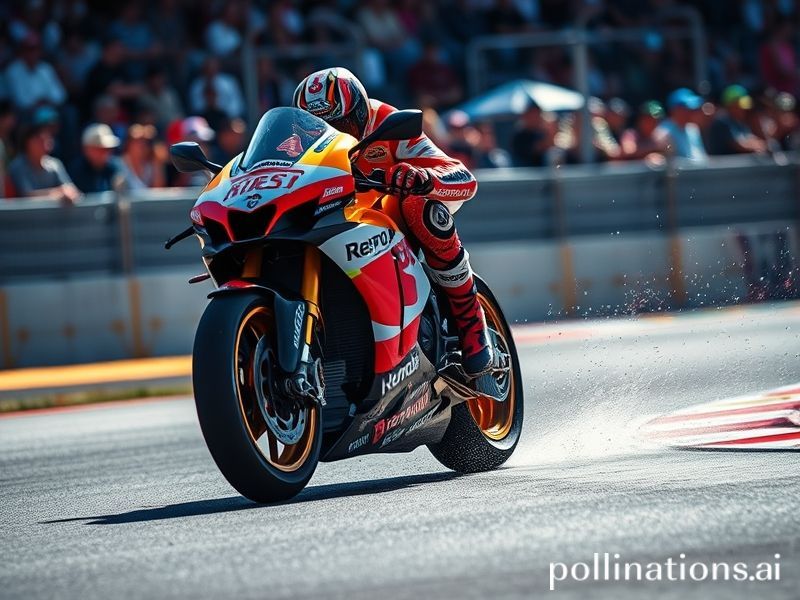Marc Márquez: The Global Gladiator Who Turns Broken Bones into World News
Marc Márquez, the Catalan kid who insists on turning internal organs into confetti, is once again the planet’s most expensive medical experiment on two wheels. While lesser mortals binge-watch geopolitical meltdowns on their phones, Márquez has spent the past decade rewriting Newtonian physics in 300-kilometre-per-hour increments, proving that the universe can be bent—but only if you’re willing to fracture a humerus, puncture a lung, or detach a retina in the process. From Jakarta to Johannesburg, the 30-year-old Spaniard is treated not merely as a motorcycle racer but as a cautionary folk tale: the man who discovered the speed of light and promptly collided with it.
Globally, Márquez functions as a living stress test for the human body and, by extension, for late-stage capitalism’s appetite for spectacle. Qatar’s Losail circuit installs floodlights bright enough to guide low-orbit satellites just so he can ride at 2 a.m. local time, pleasing European prime-time advertisers. Meanwhile, in São Paulo, street vendors sell bootleg Márquez T-shirts next to knock-off Neymar jerseys, uniting two sports that share only a common talent for destroying ACLs. The economic ripple is undeniable: every time Márquez high-sides into the gravel, Alpinestars sells another container of back protectors to terrified track-day dentists from Dubai to Detroit.
The international significance is darker. While diplomats argue over carbon credits, MotoGP’s jet-setting circus follows Márquez from Jerez to Motegi, burning avgas like the 1990s never ended. Each race weekend is a microcosm of global inequality: European fans sip €9 cappuccinos in the paddock while Thai migrant workers assemble the carbon-fiber fairings that will shortly splinter against asphalt. Márquez himself, polite to a fault, smiles through press conferences in four languages, the UN interpreter nobody asked for but everyone needs. Somewhere in Davos, a venture capitalist watches the slow-motion replay of his latest crash and doodles “human resilience premium” on a napkin.
Then there’s the geopolitical subplot. Honda’s once-unbeatable RC213V has, in Márquez’s increasingly battered hands, become a metaphor for Japanese manufacturing hubris—an iPhone on wheels that nobody can figure out how to update anymore. Ducati, smelling blood, has drafted an Italian redemption arc worthy of Netflix, complete with Borgo Panigale engineers crossing themselves as Márquez tests their wares. It’s Renaissance city-states with traction control: Florence versus Siena, but the jousting lances are forged in aerospace aluminum. The Chinese watch silently, taking notes, already prototyping the electric MotoGP bike that will make the entire gasoline opera look as quaint as jousting.
And yet, in an age when attention spans last roughly as long as a TikTok dance, Márquez still commands the planet’s gaze. When he miraculously remounted at Valencia 2021 with one working arm and still out-braked three riders into Turn 1, even the Finnish news—usually preoccupied with prime ministers who dance—cut to live coverage. Why? Because deep down, humanity prefers its existential metaphors served with tire smoke. We need someone to prove that limits exist only to be laughed at, even if the laughter is nervous and the punchline involves titanium screws.
His current “sabbatical” to recover from yet another surgery is, naturally, being monetized by everyone involved. GQ Spain has already scheduled a photoshoot: Márquez brooding in black-and-white, scars Photoshopped into badges of honor, the modern stigmata of speed. Meanwhile, ESPN’s analytics department is crunching numbers on whether he’ll return in time for the US Grand Prix, because nothing says Manifest Destiny like selling Austin real estate off the back of a Spanish daredevil.
In the end, Márquez matters because he offers the world a rare commodity: unscripted consequence. While politicians tweet through coups and billionaires rocket toward low earth orbit for Instagram likes, Márquez still risks something you can’t insure: his ability to hold a coffee cup without shaking. The planet keeps spinning, wars smolder, glaciers calve—but somewhere in a Madrid rehab clinic, a man with 20 screws in his arm is doing wrist curls, dreaming of 350 brake horsepower and the next millisecond where everything could go gloriously, catastrophically wrong. And we, the international rubbernecking collective, will be watching—because if we can’t fix the world, we might as well watch someone try to outrun it.







